“The love of Christ helped me fall in love with my husband all over again”: She cared for her husband with schizophrenia for 14 years
by Christine Leow // April 8, 2022, 6:57 pm

Margaret and her husband in Krabi, Thailand, in 2019. The memories of these seasons of clarity and normalcy are what Margaret clings to when her husband experiences relapses. All photos courtesy of Margaret Ong.
Her husband used to tell her “I love you” at every opportunity.
Said Margaret Ong: “He is very affectionate towards me. When we are in the car, he will turn to me and say, ‘I love you, dear.’
“When I brush my teeth, he would come up behind me and whisper in my ear, ‘I love you.’
“My husband truly loves me. I honestly felt his love. My children can see it, too.”
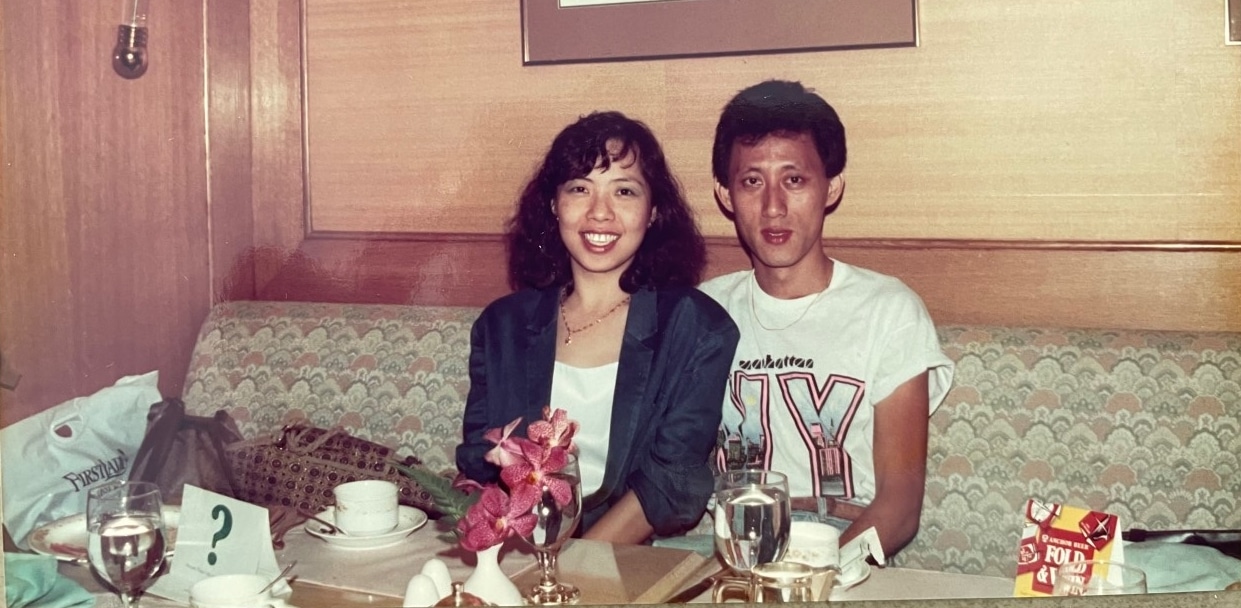
Margaret and her husband in 1990 when they were dating. Throughout their five-year courtship and in the first 16 years of marriage, there was no hint that her husband was suffering from mental illness or had problems dealing with stress.
Calling him “a true romantic”, Margaret, 59, recounted that they would always hold hands when they went out and that his hands were “full of warmth”.
“When he holds my hand, he would hold it to his heart. He used to sing that song, ‘Let’s take a walk together, hand in hand you and I.’
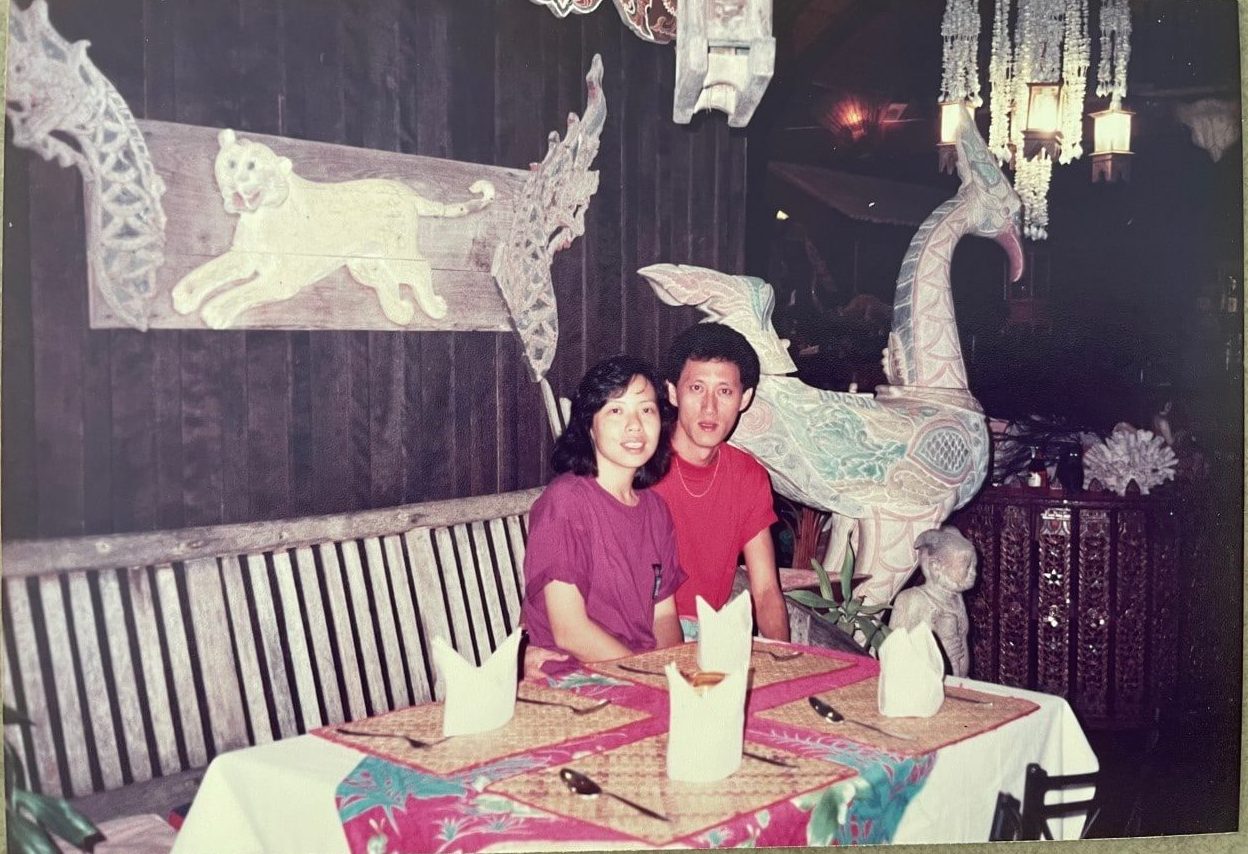
Margaret and her husband in 1989 on a holiday in Phuket.
“And when he sings to me, he would have that misty look in his eyes.”
The last time he told her he loved her was in 2018, nine years after he was diagnosed with schizophrenia.
Since then, his mental illness has progressed to a stage where “70% of the time, he is engaging in his hallucinations and delusion”.
“In his mind, he has remarried. My existence is ignored. Or he will tell the doctor I am dead.”
At other times, he thinks they have divorced and that she, too, has remarried.
Love at work
Margaret met her husband at work. She was 23 and he was a year older.
“He was a forex trader in a foreign bank and I was a forex broker. He was a client and we met at a business lunch.”
He was the perfect, loving husband who always put his wife first.
It was love at first sight for him. “From there, he dated me. He is bold but beneath that boldness, he is gentle and very caring.”
While he liked her for her independence and unassuming ways, she was drawn to his forthrightness – “he cuts to the chase and doesn’t sugarcoat things” – and the fact that he was “much more well-rounded than me”.
“He has interests in diving, fishing, music, cycling, tennis. He exposed me to these things and to a variety of cuisines. He’s basically more exciting than me. He complements me.”

The couple in 1991 enjoying the Chingay procession during the Chinese New Year period.
But there were fierce quarrels, too, in their five-year courtship. He would point out her faults, which irked her.
“I had been living on my own then, having come from Malaysia to study here. I hadn’t had a mother to nag me for years. Then, this guy comes and pinpoints my flaws.
“But when I cooled down, I realised he said it with good intentions.”
On the last day of 1990, they were engaged and had their Registry of Marriages (ROM) ceremony. Two years later, they had a customary wedding and began life as husband and wife.

The couple celebrating their engagement and ROM in 1990.
He was the perfect, loving husband who always put his wife first, said Margaret. He helped out with the housework and never minded that she was not a great cook.
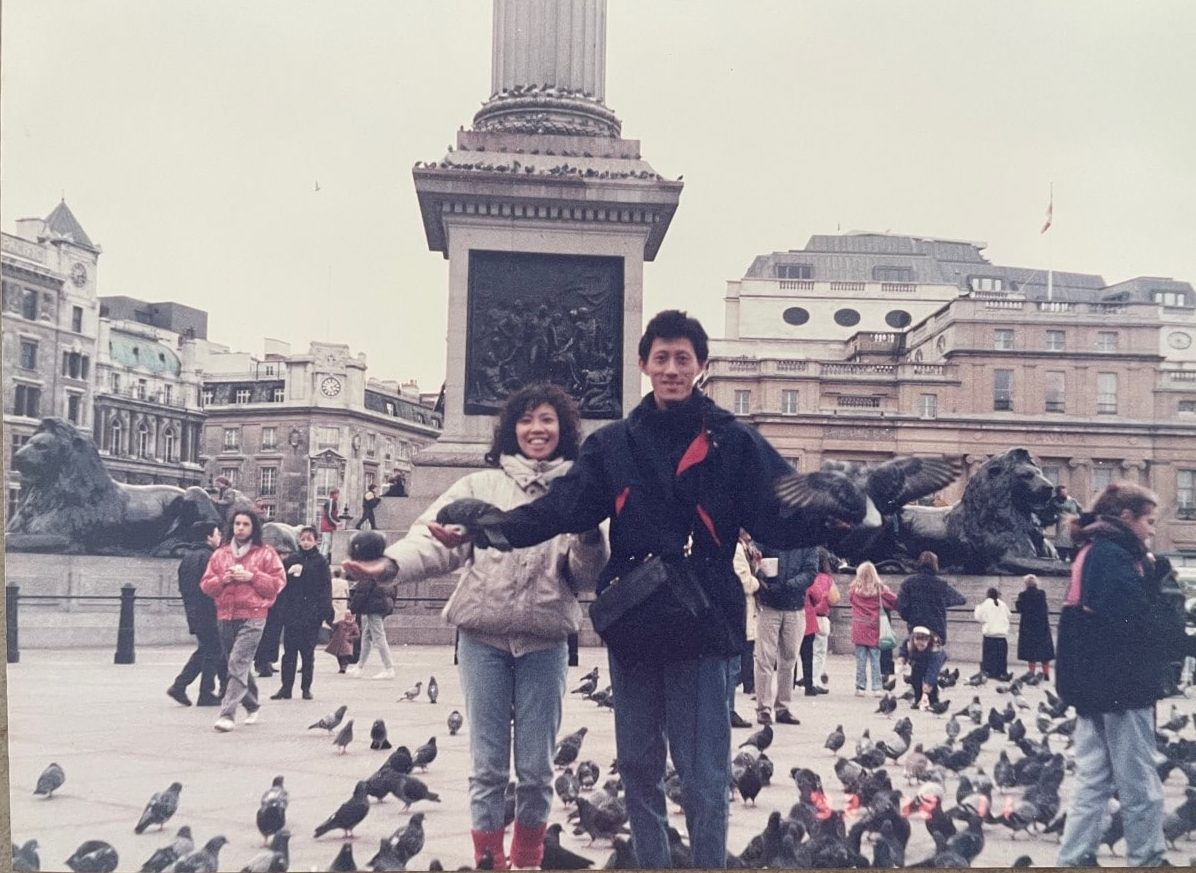
Margaret and her husband on their honeymoon in London in 1993.
“When I made sandwiches for the family, they would tell me they were full before even taking their first bite.
“He told me, ‘If you’re busy, we’ll just go out and eat. I don’t need you to know how to cook.’”
The beginning of paranoia
Two children came, life carried on and everything seemed fine for the next 16 years. Then, in mid-2008, her husband began to display odd behaviour.
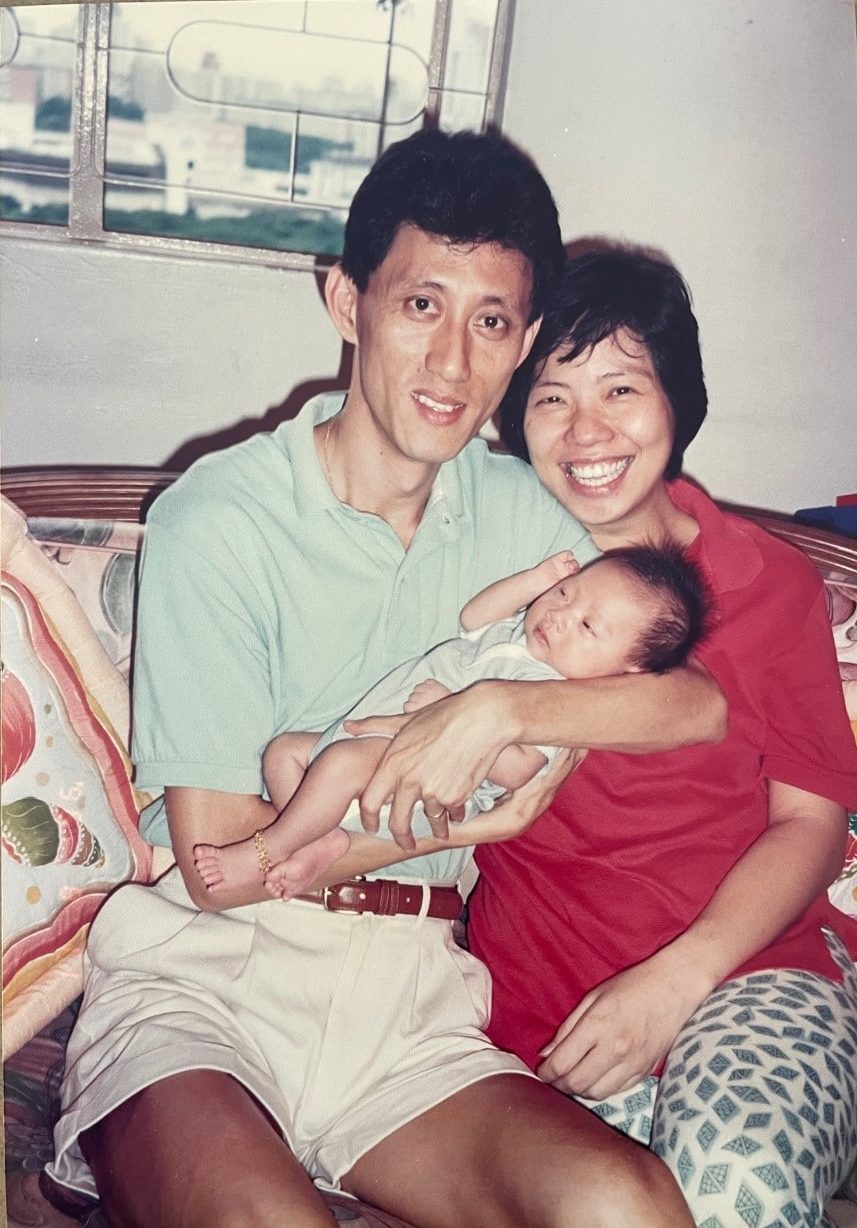
Margaret and her husband welcomed their first child in 1996.
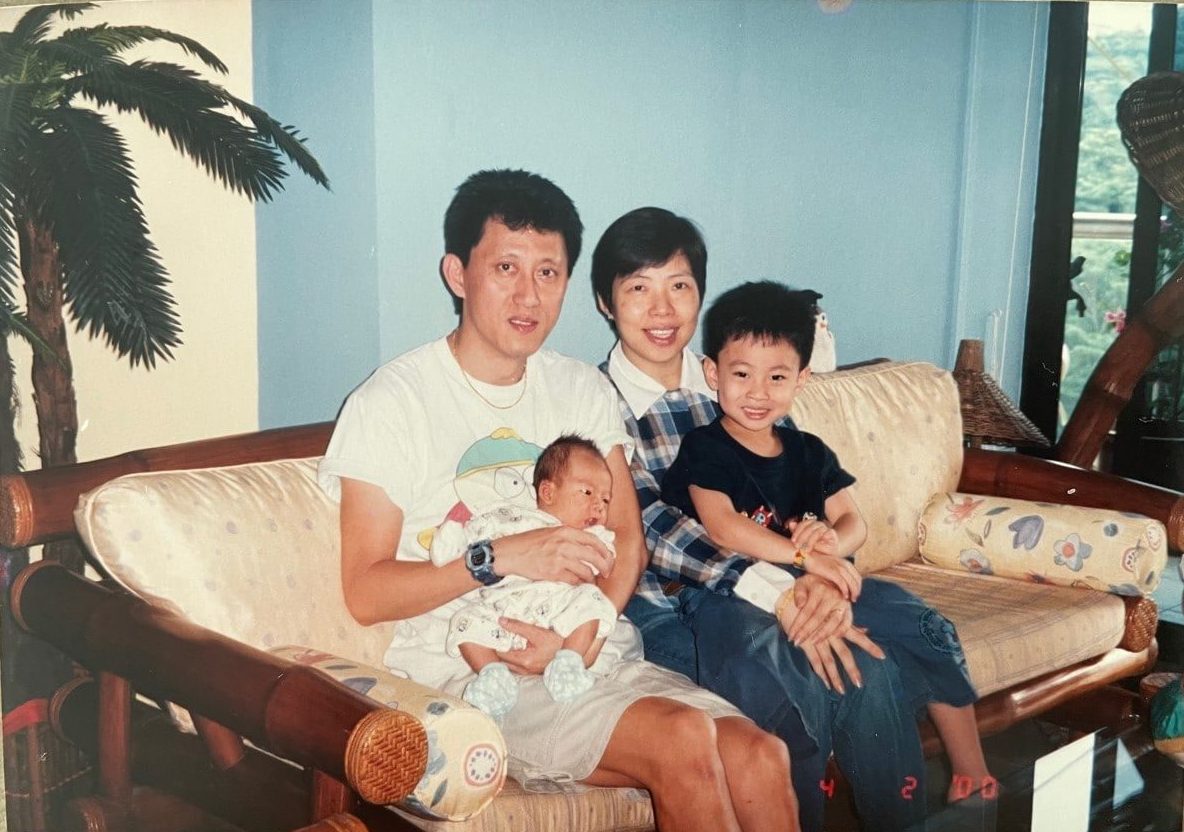
The family welcomed their second son in 2000.
“It started with him saying that someone was spying on him.”
“I came home from work one day and found that he had covered all my windows with black paper.”
By then, Margaret was flourishing in her career, travelling for work up to half the time and clocking in 15-hour days. Her husband, on the other hand, had been retrenched for the second time.
“I found it difficult to believe him. So, I brushed it aside. I expected him to be independent and able to take care of himself.”
The paranoia got worse. Soon, he suspected that their neighbour was pouring urine on the electrical box outside their flat. So, he got their elder son to stand outside their front door to keep watch.
“When I learnt about it, I went berserk. It was my son’s PSLE year. He should have been focussing on his PSLE,” said Margaret.
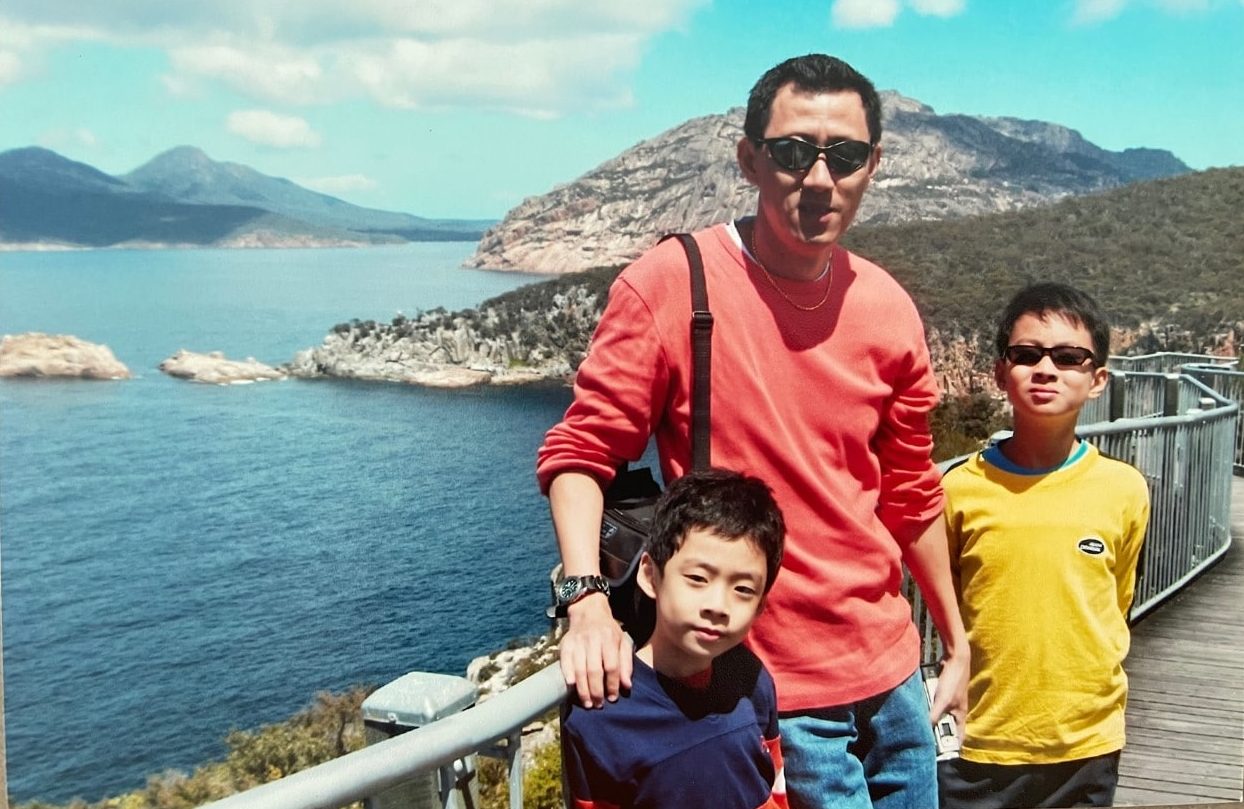
Margaret’s husband with their sons in 2005 in Tasmania.
She told her husband to install a camera outside the house instead. He heeded her advice but took her suggestion much further.
“It became an obsession. He got in a professional to install cameras at every vulnerable spot around the house where people could look in.
“I had no exposure to anyone who had mental illness.”
“I came home from work one day and found that he had covered all my windows with black paper and had put bedsheets over them.
“He switched off the lights in the house because people could look inside. Our son couldn’t even study for his PSLE.”
Not realising that this was the onset of his mental illness, Margaret became “flabbergasted and frustrated” by the person that her husband had become.
“I had had no exposure to anyone who with mental illness. So, when I looked at him, I asked, ‘Why did he change? What’s the matter with him?’
“I felt he was hindering my career because I was still aiming for an overseas posting then.”
God heard her cry
Although Margaret had been educated in a convent school in Malaysia and knew about Christianity, she had never been drawn to the faith.
“I prayed and asked God, ‘Show me You are a true God.'”
Yet, when faced with this challenge, she found herself praying to God.
“I asked God, ‘Why me? Why does this have to happen?’ I was focussing on my own emotions.
“I cried myself to sleep for nine months. I prayed and asked God, ‘Show me You are a true God. Show me You are present so that I know that I am talking to You.’”
As her husband’s mental illness developed, the usually warm and gentle man became distant and aloof. When Margaret lay in bed sobbing at night, he ignored her.
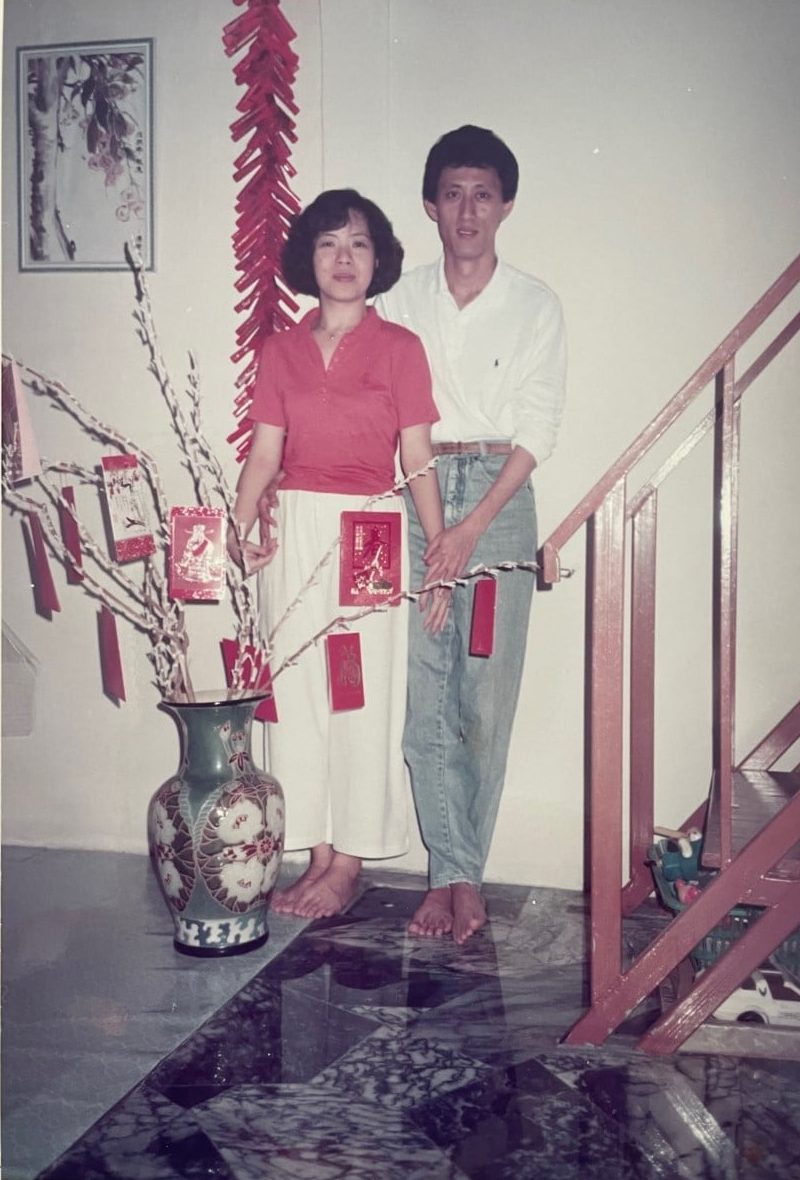
The couple in 1992 visiting Margaret’s family in Taiping, Perak. Her husband had always been very loving. But as his schizophrenia developed, he became cold towards Margaret.
But one night, something happened to show her that God had indeed heard her cries.
“It came as a surprise to everybody because he is the sort whom I felt would be able to handle stress well.”
“My husband took a tissue, turned around and said, ‘Dear, what’s wrong?’ Then, he brought me to his shoulder and patted me.
“I said, ‘Okay, God. Now You have answered me. You are present here with me. I had been crying for many months and he had not been responsive at all. Then, I experienced this.”
Eventually, things got so bad that they ended up hiring a private investigator (PI) to see if her husband was truly being followed as he had feared.
“For four days, the PI watched him and there was no evidence that someone was tailing him everywhere, calling his name.
“The PI’s closing remark to me was, ‘I think you need to take your husband to the doctor.’”

The couple as newlyweds in 1994 on a trip to Malacca.
Margaret did and her husband was diagnosed with paranoia disorder.
“He liked to help people with their problems but he wouldn’t talk about his own.”
“It came as a surprise to everybody because he is the sort whom I felt would be able to handle stress well.
“He knows how to compartmentalise, when to switch off and when to relax.”
She suspected that being retrenched for the second time was the trigger.
“He took it very hard. He believed the man of the house should be the one to bring home the bacon.
“He liked to help people with their problems but he wouldn’t talk about his own. So, there was no outlet. He appeared well in front of us.”
Living with schizophrenia
Margaret worried about what the diagnosis would mean for her. “I viewed it as a hindrance to my career.”
She also wrestled with guilt, blaming herself for “not acting earlier”.
Meanwhile, her younger son was frightened by the changes he saw in his father while her elder son was concerned that he would inherit his father’s mental illness.
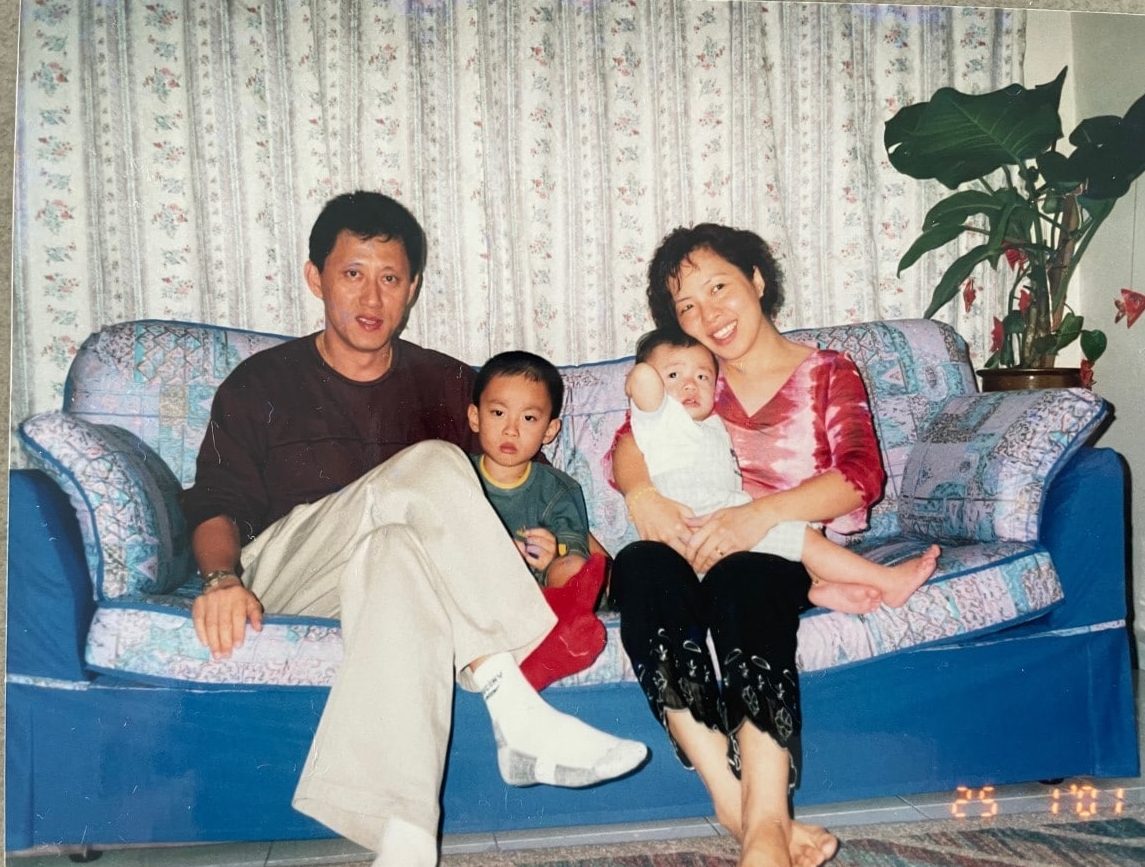
The young family in 2001.
“He asked me, ‘Which person will allow their daughter to marry me?’”
Though neither was a Christian, Margaret would encourage her son to trust in God.
“When he was afraid, I would take out the Bible and pray with him. I would put a Bible beside his bed.”

While Margaret’s husband was a firm father, their children preferred him to her when they were very young.
But her husband refused to accept that he was ill.
“We were all dealing with our own pain and struggles. It was not easy. We were a dysfunctional family in the first three years of his illness.”
Though neither was a Christian, Margaret would encourage her son to trust in God.
Margaret had to coax him to take his medication. When the medicine worked, the intervals between relapses would lengthen over time.
“We could go to Sentosa iFly indoor skydiving when he was less restless. He could follow instructions; he was focussed.”
When he was in a state of psychosis, he would hallucinate, hear voices, and be paranoid.
“He installed four latches on the door of our flat. He claimed that people would break into the house otherwise. It was very upsetting having to remove four latches to step out of the house.”
One night, believing that someone was sabotaging the air-conditioner in their room, he asked the family to move into a hotel. When Margaret refused, he went alone, booking two rooms at a five-star hotel but staying only two hours in one before returning home.
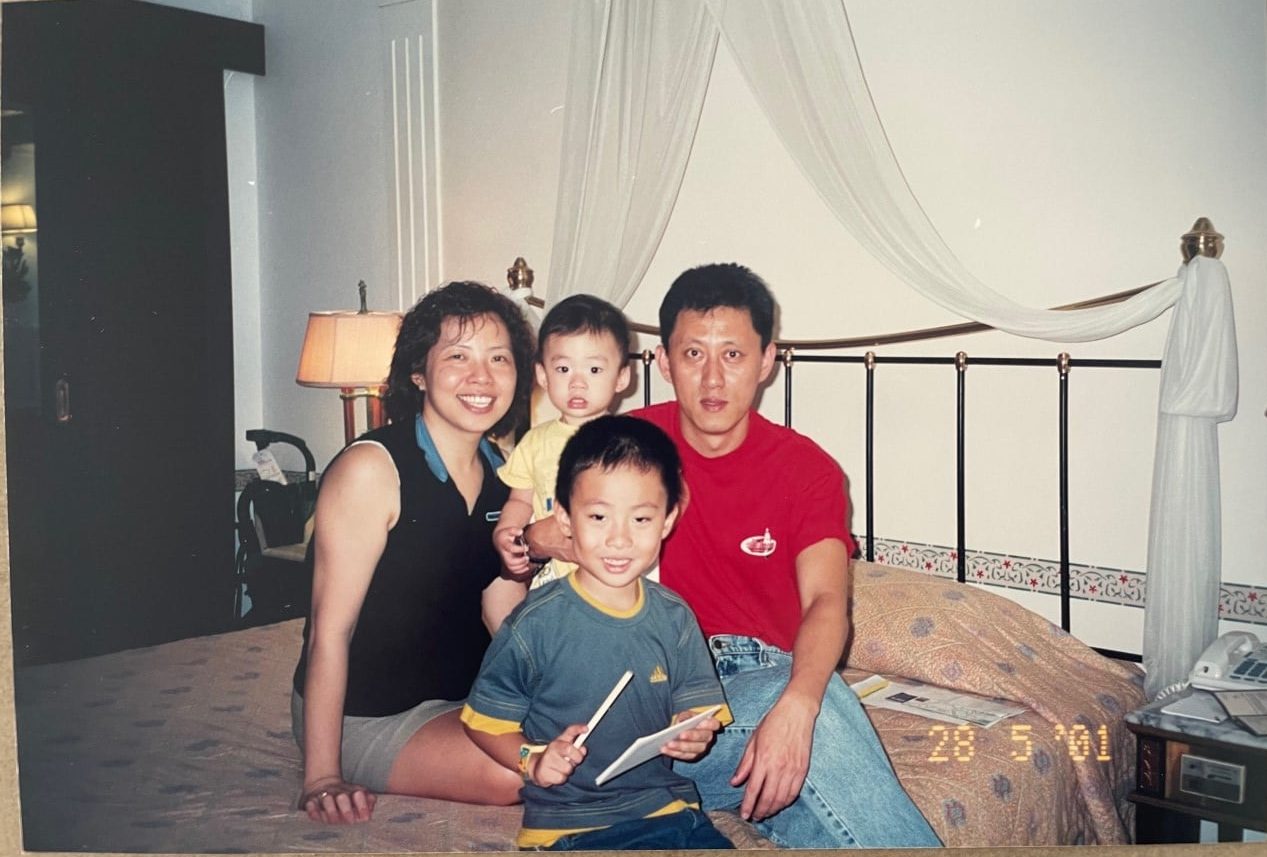
The family on a holiday in Phuket in 2001.
Her husband also had delusions of grandeur. He imagined that he was still working, and would pack for work trips, going so far as to take a taxi to the airport.
“We were all dealing with our own pain and struggles. It was not easy.”
“He tailored suits and bought luggage. He bought new pairs of shoes and told me he was flying off to the US for a meeting.
“Or he would tell me, ‘I’m being promoted.’”
He believed he owned companies – a bank, a football club, an airline – that his children could take over. He would tell Margaret that he had bought her a luxury car or a brand-new apartment.
At times, he would drive and momentarily forget how to get home. He even racked up so many unpaid parking fines that Margaret, under whose name the car was registered, was issued court summons.
God was there all along
Looking back, Margaret believes that, even then, God was with her. Several times, her husband would drive off and be uncontactable for hours.
“I would kneel and pray. There were two occasions when my girlfriend’s name came to mind. I called her to pray for my husband.
I prayed, ‘Isn’t this enough?’ I told God, ‘I don’t know how to handle all this.’”
“When she looked up, she saw my husband walking by. God was truly present in my life.”
When her elder son became a teenager, her husband’s mental illness began to put a strain on family relations.
“My son resented the additional responsibility placed upon him and became rebellious. I would ask him not to go out but to look after his dad, or pick up the medication for dad.
“He would always ask, ‘How come people my age don’t have to carry this burden?’”
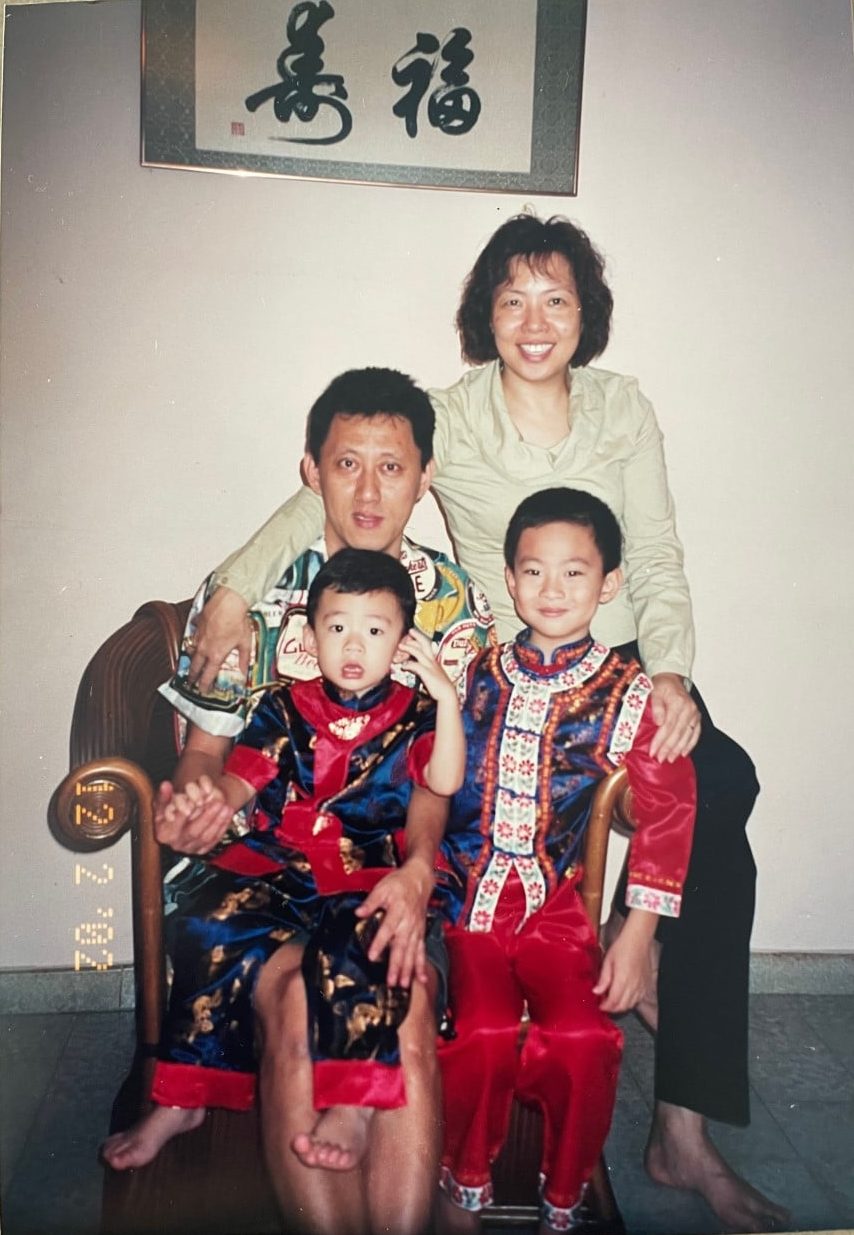
The family celebrating Chinese New Year in 2002.
Mother and child ended up having a major argument.
“One day, I prayed, ‘Isn’t this enough?’ I told God, ‘I don’t know how to handle all this.’”
That night, she found her son writing her a letter of apology. “I was so touched. Truly God is very gracious.”
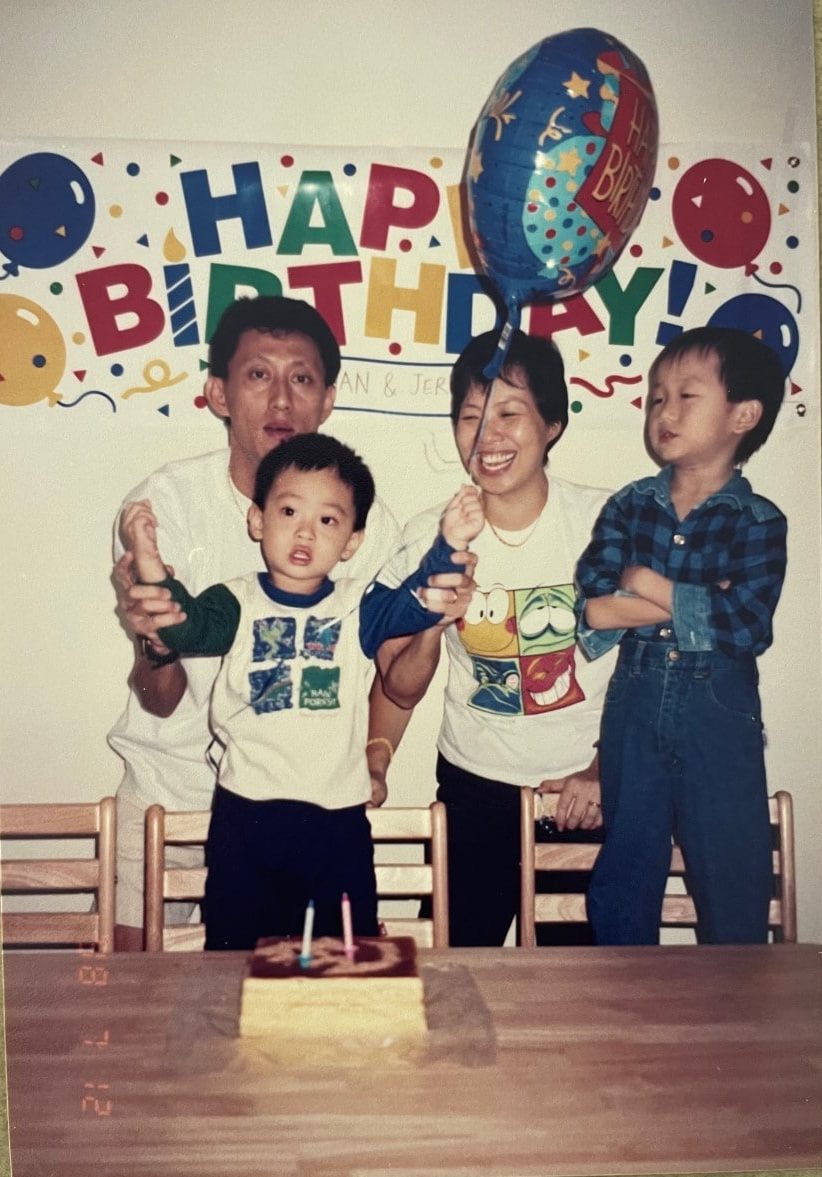
The family celebrating the birthday of their elder son with his older cousin (right).
When she decided to quit her job at a multinational IT company after working there for 20 years, Margaret again turned to God in prayer even though she was still not a Christian. It took her a few months before she felt she received the green light to leave her job.
Instead of going into full-time work, she chose to take on various part-time positions – a consultancy role, leadership workshop trainings as well as starting her own venture capital firm.
“I had put so much effort and emphasis on my career. Perhaps, I should start looking after my own life?”
Led by the Spirit
With a natural bent towards God, Margaret slowly became open to Christianity. So, when a friend she trusted invited her to church, she went.
“As I was walking through the aisle, tears started rolling for no reason.”
“I was seeking God.”
Soon, she had signed up for an inductive Bible study class to find out more about the God to whom she turned in all her times of need. She also attended Ellel Ministries Singapore for inner healing.
“I went there to deal with issues of unforgiveness of others and self and, and to renounce my ties with religions in my past.”
Nine months later, in September 2013, Margaret was baptised at Church of Our Saviour.

Margaret on one of her morning walks. As part of self-care, Margaret has been going on walks with her friends a few times a week.
“The Spirit led me to the church.
“God called me at 50.”
I had actually wanted to be a member of the church. So I’d asked them for a membership application form. Instead, they gave me a form for baptism.
“As I was walking down the aisle, tears started rolling for no reason. Then, I stopped at the counter, put down the form and started praying, ‘God, what do you want me to do? You want me to go for baptism?’
“So, I said, ‘Okay, I’ll do it.’”
She was placed in a cell group after that.
“God called me at 50,” said Margaret.
Through God’s eyes
The years to come would challenge both her faith and her love for her husband.
By 2017, almost a decade after her husband’s diagnosis, his delusions had progressed so far that he thought they were no longer married to each other.
“I came back one evening and he had called the boys into the room and wouldn’t allow me to join the discussion. And he asked the boys for permission to remarry.”
“I had to learn to separate the illness from the person.”
Then, he began ignoring her.
“It was very difficult. I fell out of love when all I saw were the ugly symptoms. When you face it every day, how can you love this person?”
That was when Margaret drew down on her faith.
“The hardest thing is toggling between being a wife and a caregiver. I had to learn to separate the illness from the person.
“If I don’t look at my husband through the lens of Christ, I would react to the illness and forget the person.
“Through this trial, I learnt to abide in God’s way. The love of Christ actually helped me fall in love with my husband all over again.”

Margaret and her husband in 2017 at a farm in Ratchaburi, Thailand.
As she sought to love her husband with God’s love, Margaret found herself becoming more compassionate towards him. She also learnt to hold on to glimpses of hope.
“Through this trial, I learnt to abide in God’s way.”
“During the phases of recovery when he was more normal, I could focus on enjoying him, doing things together and creating joyful and loving memories with him.”
Those memories would sustain her when he stopped responding to the medication altogether.
“Any increase in dosage only resulted in an increase in delusions. Worse still, he began suffering side effects such as incontinence, hand tremors and a loss of control of the muscles around the mouth.
“Some of these side effects are irreversible.”
Surrendering to God
His doctor advised Margaret to have her husband institutionalised.
“At the more advanced stage of the illness, he would need a more regimented environment than what he has at home.”
Once again, Margaret got down on her knees and turned to God in prayer.
“I had to learn to surrender to God and lean on Him.”
“I’ve learnt the meaning of surrendering to God. All I need to do is to make sure I am calm, seek Him first instead of looking for a solution on my own.”
By then, her elder son had become a Christian. Together they prayed over the decision to send her husband to the Institute of Mental Health (IMH).
In 2018, he was admitted to IMH for a short period.
“It was very difficult. I missed him. Every night, I couldn’t sleep. I was crying so much.
“I have learnt to surrender to God.”
“But when he was home, it was stressful seeing his side effects and not being able to do anything.
“I had to learn to surrender to God and lean on Him.”
Another admission followed in 2019 and they made the decision to take him off medication after several attempts to treat him failed to yield any improvement. When her husband continued to relapse, he was sent to IMH for long-term stay in June 2020.
Through it all, Margaret said she still saw God’s grace. Even though her husband continues to call her his ex-wife, she is the only one he would allow to cut his hair and shave his face.
“I have to go very close to him. His psychologist said that his mind may have rejected me but his body still has memories of me. His love for me is still intact.”
When he is more himself, he welcomes her visits with a smile, asks for updates about the world outside and allows her to play him songs from his favourite bands like Journey and the Eagles.
When their sons visit, he would give them fatherly advice about housing and driving.

Margaret’s husband teaching their younger son how to swim in 2000.
“I felt so touched. He still thinks about the family. He still cares.”
Two years on, Margaret said she is “at peace”.
While she continues to miss her husband especially since Covid safety measures have prevented her from visiting him, she no longer cries about it as much.

In the last few years, Margaret has been cycling around Singapore in the evenings a few times a week with her friends.
“In the earlier days of my faith, I would pray for his healing. I don’t pray in that manner anymore.
“I have learnt to surrender to God when all forms of treatment failed and allow Him to have His way with me and my husband.”
Margaret’s prayer now is for her husband’s salvation even as she hopes for support from the church for caregivers of persons with mental illness.
“I strongly believe there is a need for it.”
In 2017, Margaret published a book One Husband, Two Men chronicling her journey as a caregiver to her husband to raise funds for Caregivers Alliance Limited. The enterprise supports caregivers of those with mental illness. Margaret is a volunteer there.
The book was re-printed in 2021. Up to the end of April, 40% of the proceeds from the sale of the book will go to CAL.
RELATED STORIES:
How a woman’s struggle with schizophrenia resulted in a medical care portal for the mentally ill
Heartbreaking number seek help for kids with depression: Salt&Light Family Night
Religion plays a key role in wider mental health blueprint: IMH CEO
We are an independent, non-profit organisation that relies on the generosity of our readers, such as yourself, to continue serving the kingdom. Every dollar donated goes directly back into our editorial coverage.
Would you consider partnering with us in our kingdom work by supporting us financially, either as a one-off donation, or a recurring pledge?
Support Salt&Light


